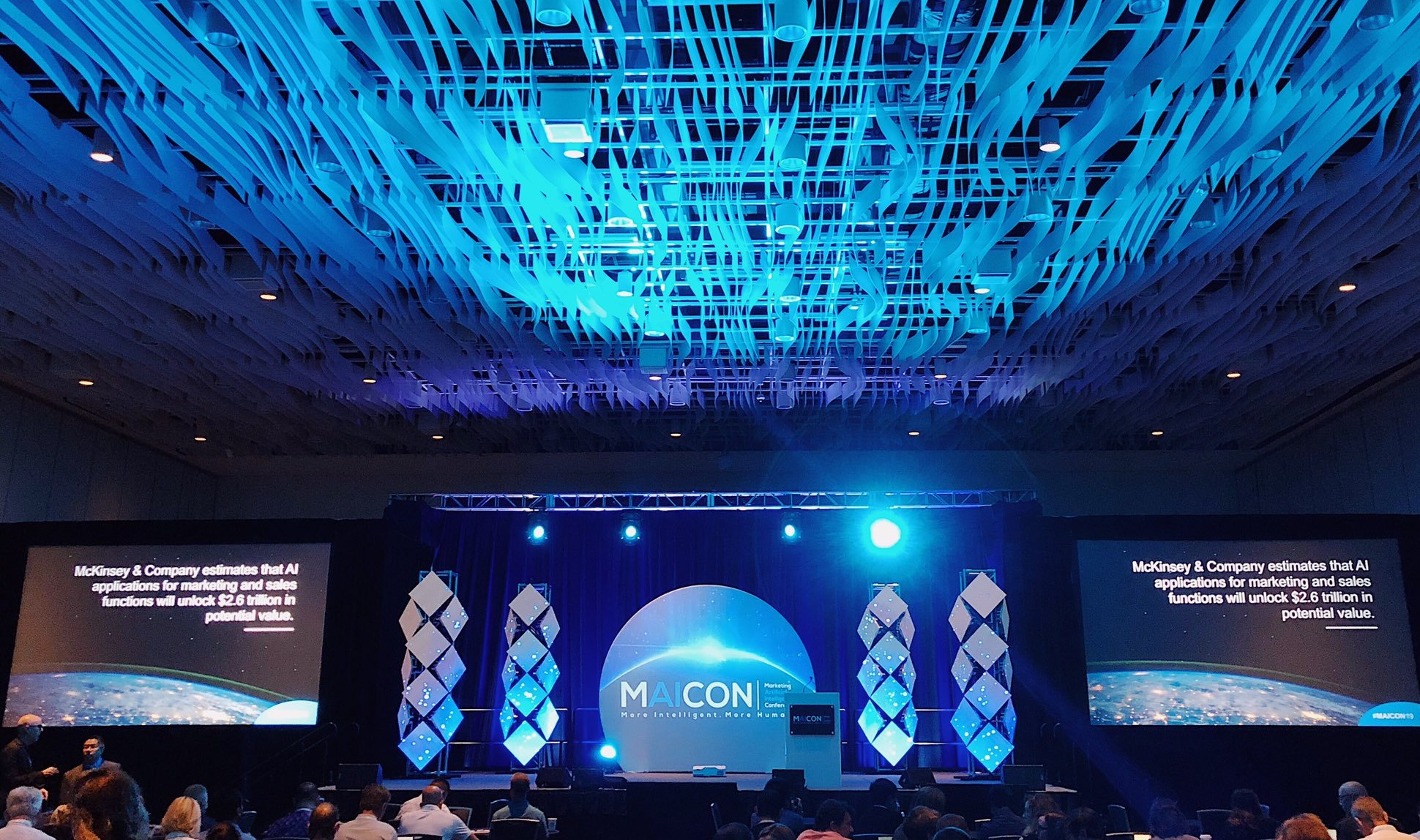After attending the first-ever Marketing & Artificial Intelligence Conference (MAICON) in Cleveland last week, I must say that I am thrilled, inspired, and eager to learn more.
The conference as a whole exceeded my expectations, especially since it was the first one ever, and perhaps because my expectations were not sky-high. It ended up being filled with dynamic speakers who you could tell were chomping at the bit to share their thoughts and opinions on the king of all buzz topics right now: artificial intelligence.
As marketers, we have all heard about, read about, and even tried to figure out AI in one way or another over the past few years. There is so much speculation out there about it taking all of our jobs.
The truth is, it will eventually take away some of our jobs, but certainly not all of them, and there are several things we can do in order to stay ahead of the algorithms and future-proof our livelihoods.
I strongly recommend that we all figure out ways to embrace AI and all of its advantages. It has already changed the game, and there is no way to halt its progress. So let’s just chill out and live on.
In this post, I’ll provide a top-level overview of what I learned at the conference, as well as some opinions and thoughts. Then, over the next few months, we’ll roll out more posts to provide further detail of some of these topics as we continue to educate ourselves, investigate new tech, and integrate AI into CSI's offerings.
Keynotes That Crushed It
First, let me start with the amazing keynote speakers at MAICON. It was a really solid lineup of AI experts and theorists, all of whom were really enjoyable.
How AI Will Change Marketing Forever
Chris Penn, who is the co-founder and Chief Innovator of Trust Insights, talked a lot about how every business wants their marketing to be better, faster, and cheaper, but in reality, study after study is showing that the opposite is happening.
This leads to things like budget cuts, staff cuts, and unrealistic performance demands. He spoke about how we, as marketers, could use AI to achieve acceleration, accuracy, and automation to both drive down costs and raise revenue.
Chris provided some key insights into how some larger brands are embracing AI and implementing it into their business operations and their digital transformation. He implored those in attendance that when starting to look into use cases for AI, they should first ask: What is the business issue that AI can solve? What data will I need to have ready, and what format will it need to be in so that the AI can do its job?
Remember, AI’s current main purpose is data mining and crunching. It can do it far faster than any human can. So, if your company has repetitive tasks that soak up a lot of time like content research, analytics, or personalization, AI can help.
Hello, Voice.
Mitch Joel, president of Six Pixels Group, delivered a really exciting keynote on voice marketing and how AI is going to change the world. He declared that “voice is the new smartphone,” and went on to provide countless examples of how voice activation and natural language processing powered by AI are already everywhere.
Amazon has launched Echo Auto and an Alexa microwave, and the Internet of Things grows by the minute. This is the new norm, the new expectation.
I mean, what could be a better UX than voice? It’s simple, right?
By the end of this year, 30% of all searches will be done by voice without a screen. Since people don’t say things the same way they type things, we all need to step our game up on voice search optimization, or we won’t be showing up at all.
Team Human: It’s Time to Remake Society Together as the Team We Are
Douglas Rushkoff, author and media theorist, gave what was, in my opinion, the most energetic and dynamic presentation of the conference. He spoke on ethics, and how we need to make sure that we (the humans) stay awake and continue to see how AI, controlled by corporations, is holding us down.
Douglas isn’t anti-AI, he is just pro-human. He declared that if we are not careful, we will “become the Things on the Internet of Things.” AI’s ability to listen to us and study our behaviors is growing and getting smarter, and we have no control over it. Amazon, Google, Apple, and IBM do, and they are calling the shots.
Nobody knows where this is all going, how smart the machines can be, or how advanced the algorithms will get, but we need to make sure we stay conscious to how the major players who are advancing AI with little regulation are integrating it into our own everyday lives.
So now for some key takeaways, that I took away, from the conference.
Takeaway #1: AI Can Make Us Better At Our Jobs
As far as AI and its place in marketing go, the possibilities are endless. From media buying and ad placement to competitive intelligence and on-site bots, AI is already being harnessed to fuel many powerful marketing and sales programs.
The use case I’m most excited to investigate further is related to how we can harness AI to help with content marketing.
Content on the web is, for the most part, unstructured data, so making sense of it all would normally take a human an immense amount of time. But if we can use AI to review our own on-site content and our competitors’ content, or better yet, review content that people are heavily engaging with and provide recommendations as to what we should be writing about and where—now that’s a great use of AI.
Let the algorithms do a task that very few humans would find any joy in.
Takeaway #2: AI Can Help Us Sell Better
I also sat in on a seminar about competitive intelligence and how AI can be applied. There are algorithms that enable businesses to track and analyze everything their competitors are doing online, and report back in coherent and understandable ways.
This information is super actionable and can accelerate sales wins, improve marketing performance, and allow teams to make much better creative and strategic decisions, saving budget and increasing returns on campaigns.
Whether you’re selling a product or a service, AI can help eliminate all those noisy competitor alerts you’re receiving every day—you know, the ones that most of us numb out to after a while and don’t know how to truly use to our advantage. It can then provide you with insights that inform how you go to market and position your brand.
This is another solid example of how AI can execute mundane tasks that absorb too much of our time—time we could spend strategizing, working on messaging, and meeting with prospects and team members.
Takeaway #3: Personalization is the rage
The new name of the game is personalization. This is even becoming the norm in the B2B world.
The way that we, as humans, have come to buy things with a single click has changed our overall expectations. We expect to stay anonymous longer, but still crave a personalized experience. We want frictionless access to content on demand, and that content better be helpful and exactly what we are looking for or the journey may end there.
So, how do we achieve this level of seamlessness and relevance? How can we hyper-personalize on-site content for each and every visitor?
How about we integrate AI that can analyze a customer’s behavioral data on the fly and display relevant content from our content library? Wouldn’t this help enable the buyer?
This AI already exists. It’s the same AI that Netflix uses; it’s called a recommender system, and it primarily harnesses information-filtering algorithms. This type of integration on our own websites can help alleviate information overload and help visitors find what they need to have an overall better experience.
Tying It All Together
These use cases for AI are super interesting, not threatening.
Of course, that doesn’t mean AI is not going to take away some of our jobs some day. If your job is something data-intensive, involves prediction, or is repetitive, then machines can probably do it better.
But if your job is creative, strategic, or involves empathy, humans will always do it better. We humans just need to find ways to make the machines work for us, taking on tasks that can be automated and freeing us up to do the things we’d rather be doing anyway. The fun stuff.
It’s important that marketers stay up to speed with what the tech giants are doing with AI, and how they plan to automate the world. Right now, there is a huge opportunity in creating voice skills. There are very few good voice apps that are branded, so I implore you to think about how you can develop something and be out in front of your competition.
This is the next big data pool, in my opinion, so let’s get excited about it, because Amazon is surely not going to wait around for us to catch up. Mitch Joel mentioned that Amazon currently has 10,000 data scientists working on Alexa. 10,000! That number is staggering.
Think they’ve invested in where they think the world is going? You bet they have.
We need to see these things not as threats, but as cues to help guide our marketing initiatives. I, for one, am excited—excited by the possibilities and advancements that can be achieved.
As I mentioned above, over the next several months, I will continue to write in more detail on many of the things mentioned in this article, as well as some posts about ethics in AI, which is a huge topic and too much to go into here.
If you’re interested in knowing more, subscribe to our blog. We'd love to have you!
Until next time, be well and be happy!
 Rich Cannava
Rich Cannava
President & Partner
The CSI Group
.png?width=250&height=153&name=CSI-OverskiesRebrand_LOGO-01(smaller).png)

.png?width=100&height=61&name=CSI-OverskiesRebrand_LOGO-01(smaller).png)


.png?width=88&name=CSI-OverskiesRebrand_LOGO-01(smaller).png)



